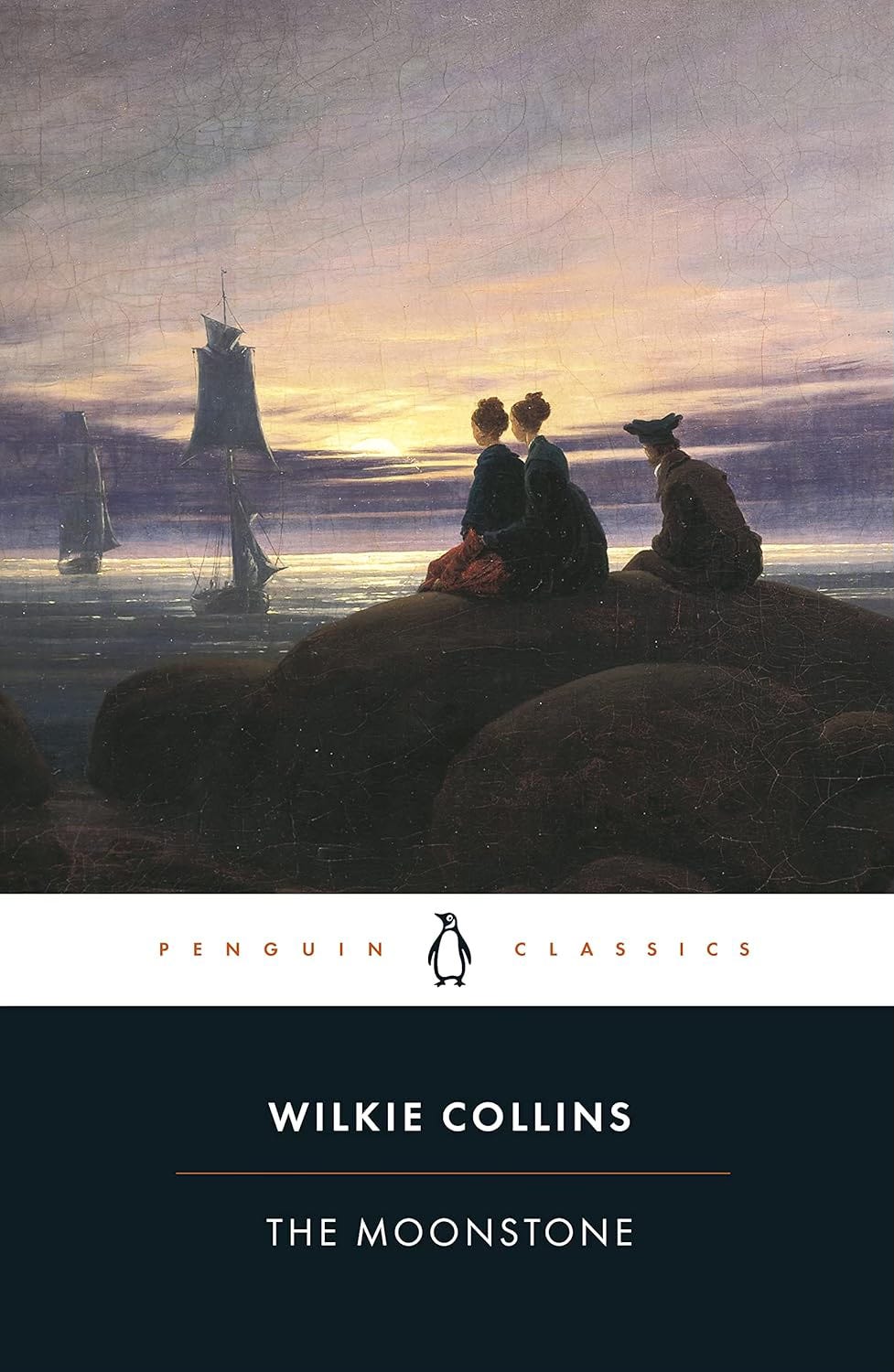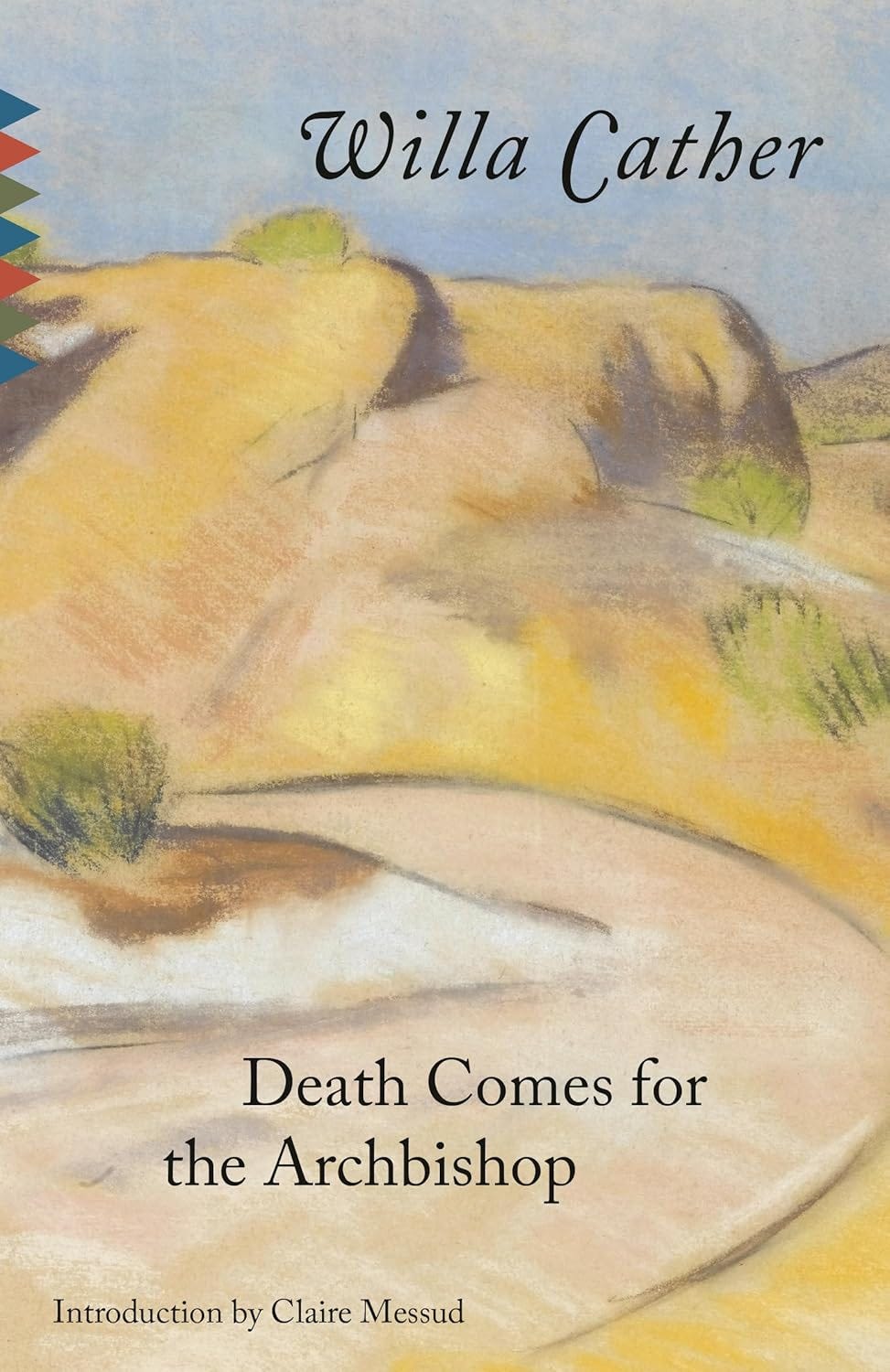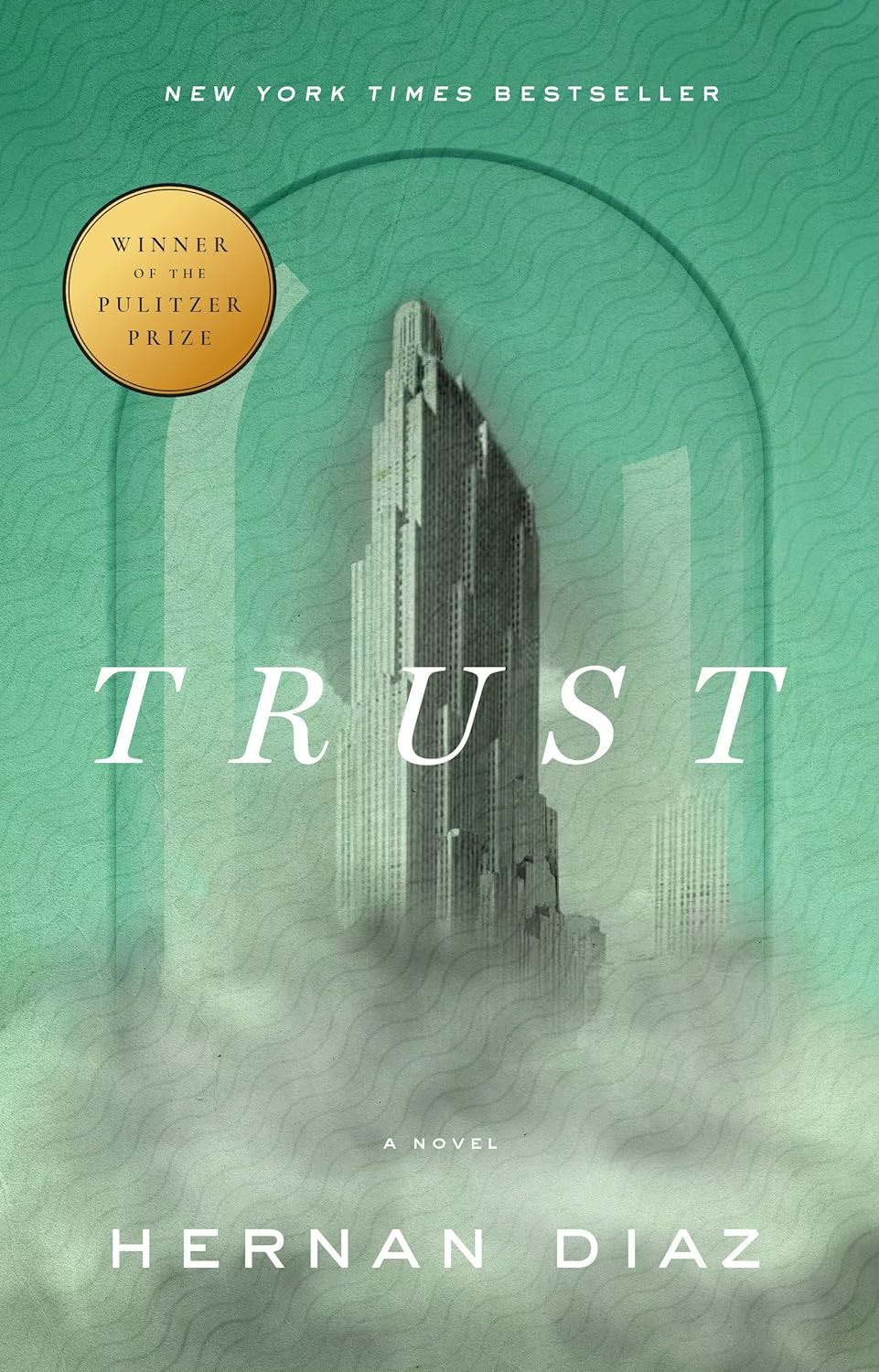The Moonstone Revisited: Section 1
Prologue, 1st Period: ch. 14 - in which our "quiet English house [is] suddenly invaded by a devilish Indian Diamond"
Welcome to Reading Revisited, a place for friends to enjoy some good old-fashioned book chat while revisiting the truth, beauty, and goodness we’ve found in our favorite books.
Happy (almost) springtime, Readers!
This season feels like a wonderful time for a book like The Moonstone. Not only are we continuing in the Reading Revisited tradition of detective fiction in April (based on the Norwegian practice of indulging in detective novels during the Easter holiday), but also the warm June setting of this section and playful tone of Betteredge’s narrative are simply delightful and bring a light tone to this mysterious story.
(P.S., in case you needed any further inducement to read this story along with us, G.K. Chesterton, in The Victorian Age in English Literature claims that The Moonstone “is probably the best detective tale in the world”. Need I say more?)
As we jump into the story, I’ll begin with a quick note on the full title of the novel, The Moonstone: A Romance. Collins does not leave us to guess what kind of a story this is going to be. By “A Romance”, his audience would have understood that this is not only a love story, but also that it is going to be a tale of adventure, suspense, and maybe even the supernatural. (I mean, come on…cursed diamond, quicksand, AND a love triangle within the first 100 pages? Sold.)
The Moonstone would also fall into the category of what the Victorians called the “sensation novel”. This sub-genre could be considered a Victorian “updating” of the gothic novel in which many of the themes are retained, but the faraway, exotic settings are replaced with much more familiar settings like upper middle class estates and family homes. Henry James famously identified the appeal of the sensation novel, and credited Wilkie Collins with being a forerunner in the genre:
“To Mr. Collins belongs the credit of having introduced into fiction those most mysterious of mysteries, the mysteries which are at our own doors. This innovation gave a new impetus to the literature of horrors Instead of the terrors of "Udolpho," we were treated to the terrors of the cheerful country house and busy London lodgings. And there is no doubt that these were infinitely the more terrible.”1
T.S. Eliot also credited The Moonstone as being:
“the first, the longest, and the best of modern English detective novels” (The Moonstone by T.S. Eliot)
So this novel, interestingly, falls into multiple categories within the Victorian literary landscape, and I’m interested to keep an eye on what we see Collins doing to bridge these genres.
So with all of this in mind, let us begin! My plan for this Read-Along Guide is to share the themes and quotations that particularly stood out to me for each section, and end with a few questions that I’m asking as we move to the next part of the narrative.
Some Themes & Quotes
Madness vs. Sanity
Right away, the mystery is brought to our (Lady Verinder’s) doorstep. I’m keeping an eye on the reactions and behaviors elicited by the Diamond. The question that lingers here, and will prove to be a central question of the novel is whether the apparent power of the Diamond is indeed supernatural or whether the “curse” the Diamond is said to carry is to be explained naturally by human wonder and/or greed.
We see right out of the gate, in the prologue, the way that lust for the diamond makes Captain Herncastle behave, “like a madman” (prologue, p. 7).
Upon Franklin Blake’s departure to Frizinghall after enlightening Betteredge as to the mysterious history of the diamond, Betteredge is dazed:
“When I heard the last of his horse’s hoofs on the drive, and when I turned about in the yard and found I was alone again, I felt half inclined to ask myself if I hadn’t woke up from a dream” (1st Period, ch 6, p. 61).
When Franklin Blake presents the diamond to Rachel, Betteredge describes its effect on the group:
“Lord bless us! It was a Diamond…When you looked down into the stone, you looked into a yellow deep that drew your eyes into it so that they saw nothing else…No wonder Miss Rachel was fascinated: no wonder her cousins screamed. The Diamond laid such a hold on me that I burst out with as large an O as the Bouncers themselves” (1st Period, ch. 9, p. 84).
Later, when reflecting on the state of Miss Rachel’s birthday dinner, Betteredge acknowledges the role the Diamond may have played in the tone of the evening:
“Looking back at the birthday now, by the light of what happened afterwards, I am half inclined to think that the cursed Diamond must have cast a blight on the whole company” (1st Period, ch. 10, p. 90).
We’re left, again, to wonder whether Betteredge’s perception of the diamond’s role in dampening the tone of the evening is plausible, or whether his own awe of the Diamond in the light of future events has made him attribute more to the diamond’s power than was truly there.
English Rationalism vs. Foreign Mysticism
This theme continues in the same vein as the above. One element we see in the various responses to the diamond and its story is the way that the “English-ness'“ of the family, home, and countryside, is contrasted with “foreign-ness” of one sort or another.
Perhaps the scene from chapter three in which the three Indians and small English boy are covertly observed by Penelope can provide an interesting metaphor for the novel’s problem as a whole. The English boy appears to be used by the Indians as some kind of medium for their “hocus pocus”, as Betteredge would call it. This vulnerable boy has been reluctantly swept up into something sinister that he seems to not fully understand, and that is arguably what happens to the entire household at the arrival of the Diamond.
Franklin Blake’s arrival and Betteredge’s impression of him and his “foreign” education” is contrasted with Betteredge’s own English common-sense approach to life. He also confirms that Rachel has noticed an odd “conglomeration” of varying sides to Mr Franklin’s character:
“these puzzling shifts and transformations in Mr Franklin were due to the effect on him of his foreign training…he had been sent abroad, and had been passed on from one nation to another, before there was time for any one coloring more than another to settle itself on him firmly. As a consequence of this, he had come back with so many different sides to his character, all more or less jarring with each other, that he seemed to pass his life in a perpetual contradiction with himself” (1st period, ch. 6, p 59).
Looking back to the range of reactions elicited by the Diamond’s appearance, one in particular stands out:
“The only one of us who kept his senses was Mr Godfrey. He put an arm round each of his sisters’ waists, and, looking compassionately backwards and forwards between the Diamond and me, said, ‘Carbon, Betteredge! Mere carbon, my good friend, after all!’” (1st period, ch. 9, p. 84).
Betteredge clearly upholds Godfrey’s reaction over and against the others, and seems to admire his frankness and rationalism. Note the language he uses to compare Godfrey and Mr. Franklin:
“Mr Franklin was a perfect savage by comparison with him” (1st period, ch. 9, p. 84).
Finally, Betteredge does not hide his skeptical view of Mr. Murthwaite, the celebrated Indian traveller. When Murthwaite praises Mr. Franklin’s luck and makes clear that the Indians wouldn’t hesitate to take a life for the sake of retrieving the Diamond, Betteredge expresses his doubts and scorn of this idea:
“This sort of thing didn’t at all square with my English ideas” (1st period, ch 10, p. 98).
The Trustworthiness of Appearances
The story has opened with the Verinder home in, at least apparent, order. Betteredge is relaxing in the sun, pipe in hand, Robinson Crusoe on his mind, and all is right with the world. The first small moment of discord comes with Rosanna Spearman’s flight to the sands in chapter four. This tells me that Rosanna is someone we need to keep an eye on as the narrative unfolds.
Rosanna’s physical deformity is also worth noting as we often see in literature physical deformity serving as metaphor for a moral/spiritual one.
The physical appearances of the two detectives are contrasted by Betteredge:
“Mr Seegrave was tall and portly, and military in his manners. He had a fine commanding voice, and a mighty resolute eye, and a grand frock-coat which buttoned beautifully up to his leather stock. ‘I’m the man you want!’ was written all over his face” (1st period, ch. 11, p. 111).
Now observe the way Betteredge describes Seargent Cuff’s physical appearance:
“His walk was soft; his voice was melancholy; his long lanky fingers were hooked like claws. He might have been a parson, or an undertaker — or anything else you like, except what he really was. A more complete opposite to Superintendent Seegrave than Sergeant Cuff, and a less comforting officer to look at, for a family in distress, I defy you to discover, search where you may” (1st period, ch. 12, p. 127)
The discrepancies in the physical appearance, and the way that Seargent Cuff, despite being a celebrated London detective, does not at all “look the part” is intriguing and perhaps sets a pattern that will be frequently adopted by future writers of detective fiction.
A Few LOL Moments - Courtesy of Betteredge:
I cannot express just how delightful I have found the narrative voice of Betteredge - just for fun, here are some favorite of his quotes from this section:
"It is one of my rules in life, never to notice what I don’t understand” (1st period, ch. 6, p. 58)
"the two Miss Ablewhites were cheerful enough for twenty…They were nearly as big as their brother…overflowing with superabundant flesh and blood…I declare they bounced on the ground as if they were made of India-rubber. Everything the Miss Ablewhites said began with a large O…they giggled and screamed, in season and out of season, on the smallest provocation. Bouncers - that’s what I call them.” (p. 82)
“my daughter had got the hair-brush by this time, and the whole strength of her feeling had passed into that. If you are bald, you will understand how she scarified me. If you are not, skip this bit, and thank God you have got something in the way of a defense between your hair-brush and your head.” (p. 86)
Final Thoughts/Questions
Names: I’m seeing a lot of biblical names in this section (Gabriel, Rachel, Samuel), and other names that could certainly hold literary significance (i.e Penelope, Rosanna (the rose theme seems to be coming up quite a lot…with Sgt. Cuff), Godfrey Abelwhite, Seagrave). This is something I’m going to keep an eye on going forward.
Robinson Crusoe: The opening line of the First Period narrative reads as follows:
“In the first part of Robinson Crusoe, at page one hundred and twenty-nine, you will find it thus written:
‘Now I saw, though too late, the Folly of beginning a Work before we count the Cost, and before we judge rightly of our own Strength to go through with it.’” (1st period, ch 1, p. 15)
This opening line certainly sets the stage, and has me thinking about “counting the cost” and what this means in our story. More on this in the coming chapters!
Until next time, keep revisiting the good books that enrich your life and nourish your soul.
In Case You Missed It:
On the Podcast:
ep. 44: Taylor Swift & The Art of Storytelling w/ Katie Marquette
What We’re Reading Now/Next:
April
The Moonstone by Wilkie Collins
May
Death Comes for the Archbishop by Willa Cather
June
Trust by Hernan Diaz
A Few Reminders:
If you are wanting to get in on the in person or virtual community please contact us!
We have turned on paid subscriptions which will allow you to support the work we are doing here as well as receive Read Along Guide PDFs each month, voice recordings of the Read Along Guides and Essays, and we are working on (printable) bookmarks for each book.
If you would like to make a small contribution to the work we’re doing here at Reading Revisited, we invite you to do so with the Buy (Us) a Coffee button below. We so appreciate your support!
*As always, some of the links are affiliate links. If you don’t have the books yet and are planning to buy them, we appreciate you using the links. The few cents earned with each purchase you make after clicking links (at no extra cost to you) goes toward the time and effort it takes to keep Reading Revisited running, and we appreciate it!
Reading Revisited is a reader-supported publication. To receive new posts and support our work, consider becoming a free or paid subscriber.
Reading Revisited is a reader-supported publication. To receive new posts and support our work, consider becoming a free or paid subscriber.
This comes from his article entitled “Miss Braddon” from the November 1865 edition of “The Nation”.









I also am very much enjoying Mr. Betteredge’s voice. Fourteen chapters in, I’m invested in all the characters and ready to read on.